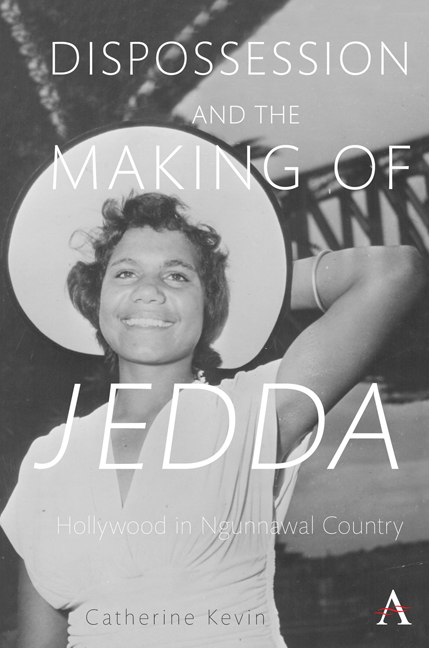Book contents
- Frontmatter
- Dedication
- Contents
- List of Figures
- Acknowledgements
- Introduction: Jedda (1955): Cultural Icon and Shared Artefact of Mid-Twentieth-Century Colonialism
- 1 Financing Jedda
- 2 Hollywood in the ‘Fine Wool Hub’
- 3 Making Jedda
- 4 Viewing Jedda
- Epilogue: Bogolong Memories and the Conceit of Family History
- Index
- Frontmatter
- Dedication
- Contents
- List of Figures
- Acknowledgements
- Introduction: Jedda (1955): Cultural Icon and Shared Artefact of Mid-Twentieth-Century Colonialism
- 1 Financing Jedda
- 2 Hollywood in the ‘Fine Wool Hub’
- 3 Making Jedda
- 4 Viewing Jedda
- Epilogue: Bogolong Memories and the Conceit of Family History
- Index
Summary
‘Jedda Is YOUR Film’
Dawn was the New South Wales Protection and Welfare Boards’ monthly publication. Between 1915 and 1969 it circulated among Aboriginal people, young and old, living on state-runmissions such as Hollywood in Yass, managed reserves and institutions for Aboriginal children, including the Cootamundra Girls’ Home. In September 1954, in anticipation of the release of the Chauvels’ film the magazine featured an anonymous article called ‘Jedda Is YOUR Film’. This introduced the film with reference to the ‘large number of Aborigines’ employed for its production. It told the story of Charles Chauvel's ‘primary ambition’ to make a film in the Northern Territory, and his subsequent realization that this would require the ‘skill, knowledge and loyalty’ of Indigenous Territorians without which ‘there would have been no real development of the resources of this savagely beautiful area’. The author's original premise was the crucial mutual recognition and cooperation between Chauvel and the Aboriginal people he employed in the making of Jedda. This sentiment was then given a romantic past in the Northern Territory. The article slides into an account of the processes of ‘development’, a euphemism for colonization, specifically their reliance on a mutual appreciation, indeed a loyalty between Indigenous people and Europeans. This account obscured the recent history of violent colonization in the Northern Territory.
The savage and the beautiful sit side by side here and the reader is explicitly positioned at a distance from them both. Given the assimilation aims of Dawn, as an instrument of the New South Wales Protection Board, the article is an ode to its own success and that of the agency it represents. It warns the reader that they will find much of the content of the film as strange as white audiences will, yet they are reassured that ‘nothing has been exaggerated, nothing distorted, nothing garbled’. Although Aboriginal people were employed on and off set, a central message at the opening of the article, the author explains that it is a European, that ‘well-knownTerritorian’ Bill Harney (Figure 11), who is responsible for keeping ‘Hollywooditis’ out of the film and ensuring its ‘authenticity’.
- Type
- Chapter
- Information
- Dispossession and the Making of JeddaHollywood in Ngunnawal Country, pp. 57 - 80Publisher: Anthem PressPrint publication year: 2020



